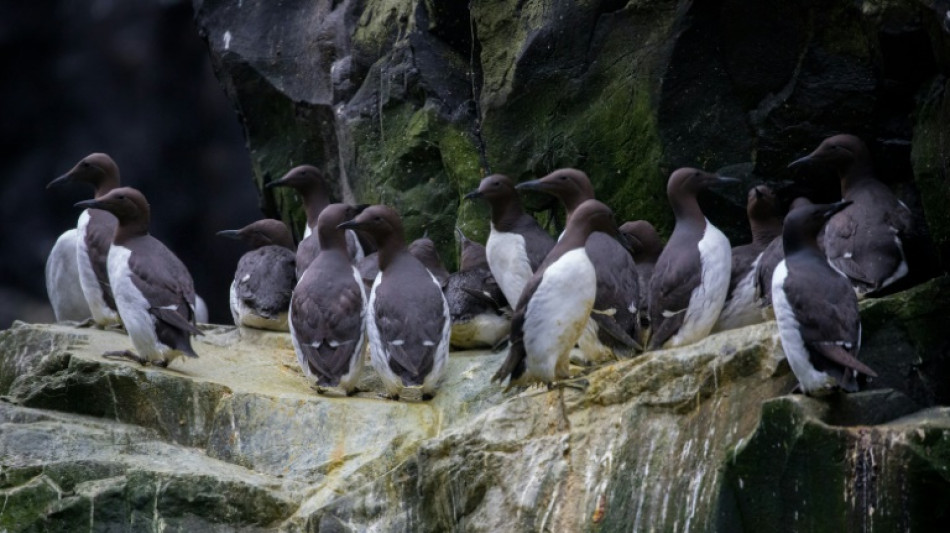
-
 Suspect in deadly Christmas market attack railed against Islam and Germany
Suspect in deadly Christmas market attack railed against Islam and Germany
-
At least 32 die in bus accident in southeastern Brazil

-
 Freed activist Paul Watson vows to 'end whaling worldwide'
Freed activist Paul Watson vows to 'end whaling worldwide'
-
Chinese ship linked to severed Baltic Sea cables sets sail

-
 Sorrow and fury in German town after Christmas market attack
Sorrow and fury in German town after Christmas market attack
-
Guardiola vows Man City will regain confidence 'sooner or later' after another defeat

-
 Ukraine drone hits Russian high-rise 1,000km from frontline
Ukraine drone hits Russian high-rise 1,000km from frontline
-
Villa beat Man City to deepen Guardiola's pain

-
 'Perfect start' for ski great Vonn on World Cup return
'Perfect start' for ski great Vonn on World Cup return
-
Germany mourns five killed, hundreds wounded in Christmas market attack

-
 Odermatt soars to Val Gardena downhill win
Odermatt soars to Val Gardena downhill win
-
Mbappe's adaptation period over: Real Madrid's Ancelotti

-
 France's most powerful nuclear reactor finally comes on stream
France's most powerful nuclear reactor finally comes on stream
-
Ski great Vonn finishes 14th on World Cup return

-
 Scholz visits site of deadly Christmas market attack
Scholz visits site of deadly Christmas market attack
-
Heavyweight foes Usyk, Fury set for titanic rematch

-
 Drone attack hits Russian city 1,000km from Ukraine frontier
Drone attack hits Russian city 1,000km from Ukraine frontier
-
Former England winger Eastham dies aged 88

-
 Pakistan Taliban claim raid killing 16 soldiers
Pakistan Taliban claim raid killing 16 soldiers
-
Pakistan military courts convict 25 of pro-Khan unrest

-
 US Congress passes bill to avert shutdown
US Congress passes bill to avert shutdown
-
Sierra Leone student tackles toxic air pollution

-
 German leader to visit site of deadly Christmas market attack
German leader to visit site of deadly Christmas market attack
-
16 injured after Israel hit by Yemen-launched 'projectile'

-
 Google counters bid by US to force sale of Chrome
Google counters bid by US to force sale of Chrome
-
Russia says Kursk strike kills 5 after Moscow claims deadly Kyiv attack

-
 Cavaliers cruise past Bucks, Embiid shines in Sixers win
Cavaliers cruise past Bucks, Embiid shines in Sixers win
-
US President Biden authorizes $571 million in military aid to Taiwan

-
 Arahmaiani: the Indonesian artist with a thousand lives
Arahmaiani: the Indonesian artist with a thousand lives
-
Indonesians embrace return of plundered treasure from the Dutch

-
 Qualcomm scores key win in licensing dispute with Arm
Qualcomm scores key win in licensing dispute with Arm
-
Scientists observe 'negative time' in quantum experiments

-
 US approves first drug treatment for sleep apnea
US approves first drug treatment for sleep apnea
-
US drops bounty for Syria's new leader after Damascus meeting

-
 Saudi man arrested after deadly car attack on German Christmas market
Saudi man arrested after deadly car attack on German Christmas market
-
'Torn from my side': horror of German Christmas market attack

-
 Bayern Munich rout Leipzig on sombre night in Germany
Bayern Munich rout Leipzig on sombre night in Germany
-
Tiger in family golf event but has 'long way' before PGA return

-
 Pogba wants to 'turn page' after brother sentenced in extortion case
Pogba wants to 'turn page' after brother sentenced in extortion case
-
Court rules against El Salvador in controversial abortion case

-
 French court hands down heavy sentences in teacher beheading trial
French court hands down heavy sentences in teacher beheading trial
-
Israel army says troops shot Syrian protester in leg

-
 Tien sets-up all-American NextGen semi-final duel
Tien sets-up all-American NextGen semi-final duel
-
Bulked-up Fury promises 'war' in Usyk rematch

-
 Major reshuffle as Trudeau faces party pressure, Trump taunts
Major reshuffle as Trudeau faces party pressure, Trump taunts
-
Reggaeton star Daddy Yankee in court, says wife embezzled $100 mn

-
 Injured Eze out of Palace's clash with Arsenal
Injured Eze out of Palace's clash with Arsenal
-
Norway's Deila named coach of MLS Atlanta United

-
 Inter-American Court rules Colombia drilling violated native rights
Inter-American Court rules Colombia drilling violated native rights
-
Amazon expects no disruptions as US strike goes into 2nd day


Single heat wave wiped out millions of Alaska's dominant seabird
The common murre, a large black-and-white seabird native to northern waters, has become far less common in Alaska over the past decade due to the impacts of climate change.
A study published Thursday in Science reveals that a record-breaking marine heat wave in the northeast Pacific from 2014 to 2016 triggered a catastrophic population collapse, wiping out four million birds -- about half the species in the region.
Strikingly, they have shown little signs of rebounding, suggesting long-term shifts in the food web that have locked the ecosystem into a troubling new equilibrium.
"There's a lot of talk about declines of species that are tied to changes in temperature, but in this case, it was not a long term result," lead author Heather Renner of the Alaska Maritime National Wildlife Refuge told AFP.
"To our knowledge, this is the largest mortality event of any wildlife species reported during the modern era," she and her colleagues emphasized in their paper.
The finding triggers "alarm bells," Renner said in an interview, as human-caused climate change makes heat waves more frequent, intense, and longer-lasting.
- Emaciated Carcasses -
With their dapper, tuxedoed look, common murres are sometimes called the "penguins of the north."
Their slender wings power them across vast distances in search of food and make them expert divers. But even these hardy seabirds were no match for an unprecedented environmental catastrophe.
The largest marine heat wave ever recorded began in the late fall of 2014, spanning a massive swath of the northeast Pacific Ocean from California to Alaska.
It persisted for over two years, leaving devastation in its wake. During this time, some 62,000 emaciated murres washed ashore along the North American Pacific coastline -- dead or dying from starvation.
Experts point to two key reasons for the bird deaths: elevated ocean temperatures reduced both the quality and quantity of phytoplankton, impacting fish like herring, sardines, and anchovies -- the mainstay of the murre diet.
At the same time, warmer waters increased the energy demands of larger fish, such as salmon and Pacific cod, which compete with murres for the same prey.
"We knew then it was a big deal, but unfortunately, we couldn't really quantify the effects," explained Renner.
For years after the event, breeding colonies failed to produce chicks, complicating efforts to assess the full impact.
Earlier estimates pegged the number of deaths at around a million, but a more robust analysis -- drawing on data from 13 murre colonies -- revealed the toll was four times higher.
"It is just so much worse than we thought it was," Renner said of the new findings.
- Climate winners and losers -
The marine heat wave didn't just impact common murres. Pacific cod stocks collapsed, king salmon populations dwindled, and as many as 7,000 humpback whales perished.
Yet the crisis created an uneven playing field: some species emerged unscathed, while others even thrived.
Thick-billed murres, which often share nesting cliffs with common murres, were largely unaffected, possibly due to their more adaptable diet, Renner noted.
For common murres, however, the fallout lingers. Despite nearly a decade since the heat wave, their numbers show no sign of bouncing back -- and the losses may well be permanent.
Part of the reason lies in the long-term decline of some of their prey.
Another factor is murres' survival strategy relies on numbers: they aggregate in massive colonies to protect their eggs from opportunistic predators like eagles and gulls.
With their populations slashed, these birds have lost their critical safety buffer.
Still, Renner offered a glimmer of hope.
While addressing global warming is essential for curbing long-term climate change, conservation efforts can make a difference in the short term, she said.
Removing invasive species like foxes and rats from murre nesting islands could also provide the beleaguered birds with a fighting chance.
J.Oliveira--PC




